Why you can trust Tom's Hardware
Like its other siblings, the Core i7-12700K comes to market with disruptive pricing. As a result, the $409 Core i7-12700K beats the price-comparable $390 Ryzen 7 5800X by tremendous margins and even rivals the $550 Ryzen 9 5900X. The 12700K even provides basically the same gaming performance as the world's fastest gaming chip, the $589 Core i9-12900K, but for $180 less.
Intel's Alder Lake pricing is very impressive, but the company's decision to bring only Z690 motherboards to market takes a bit of the shine off the value proposition, at least until the more affordable B- and H-series motherboards arrive in the coming months. At least the chip pricing takes a little of the sting out of the inevitable high platform costs associated with Z690 motherboards.
Below, we have the geometric mean of our gaming test suite at 1080p and 1440p and a cumulative measure of performance in single- and multi-threaded applications. Remember that we conducted the gaming tests with an RTX 3090, so performance deltas will shrink with lesser cards and higher resolution and fidelity settings.
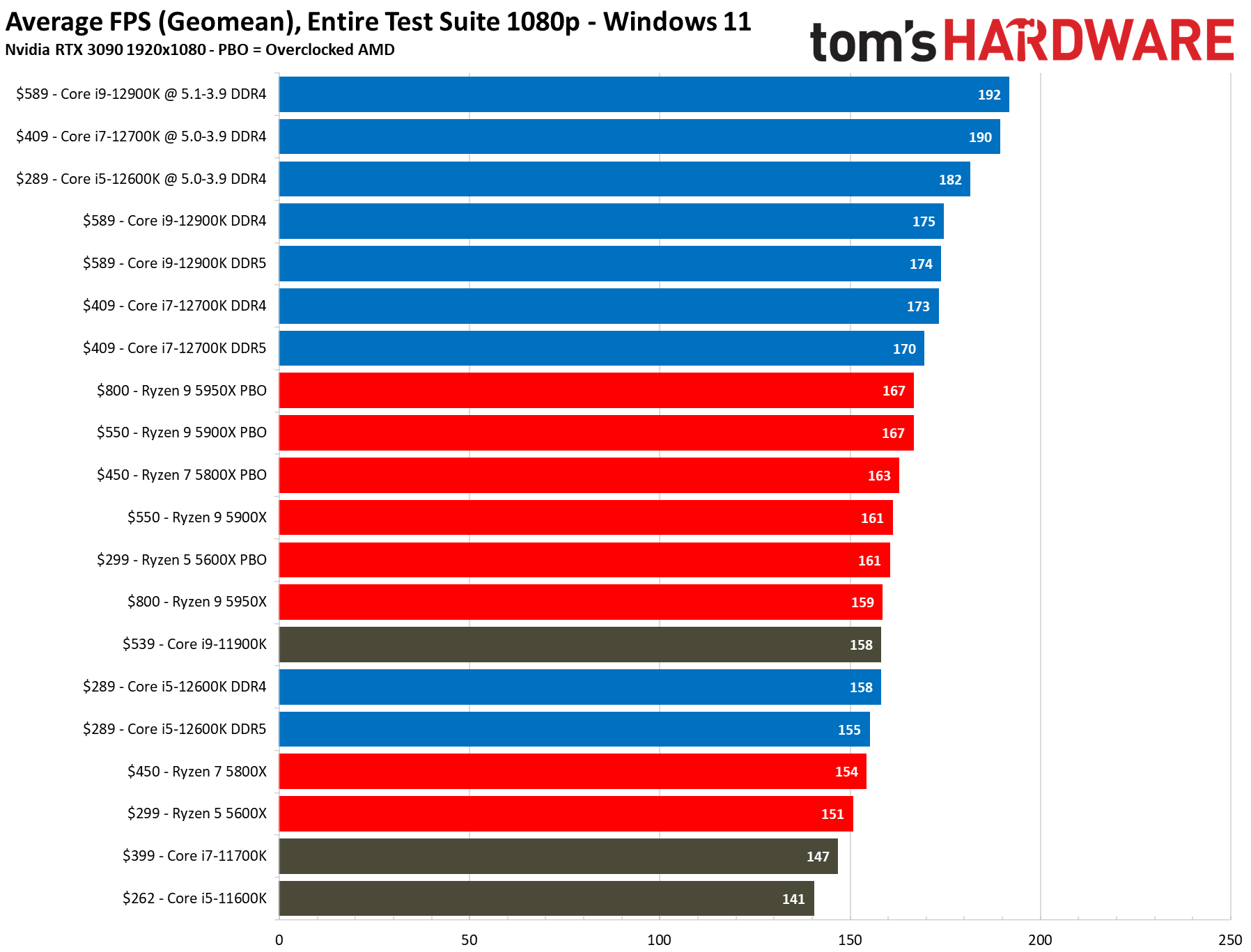
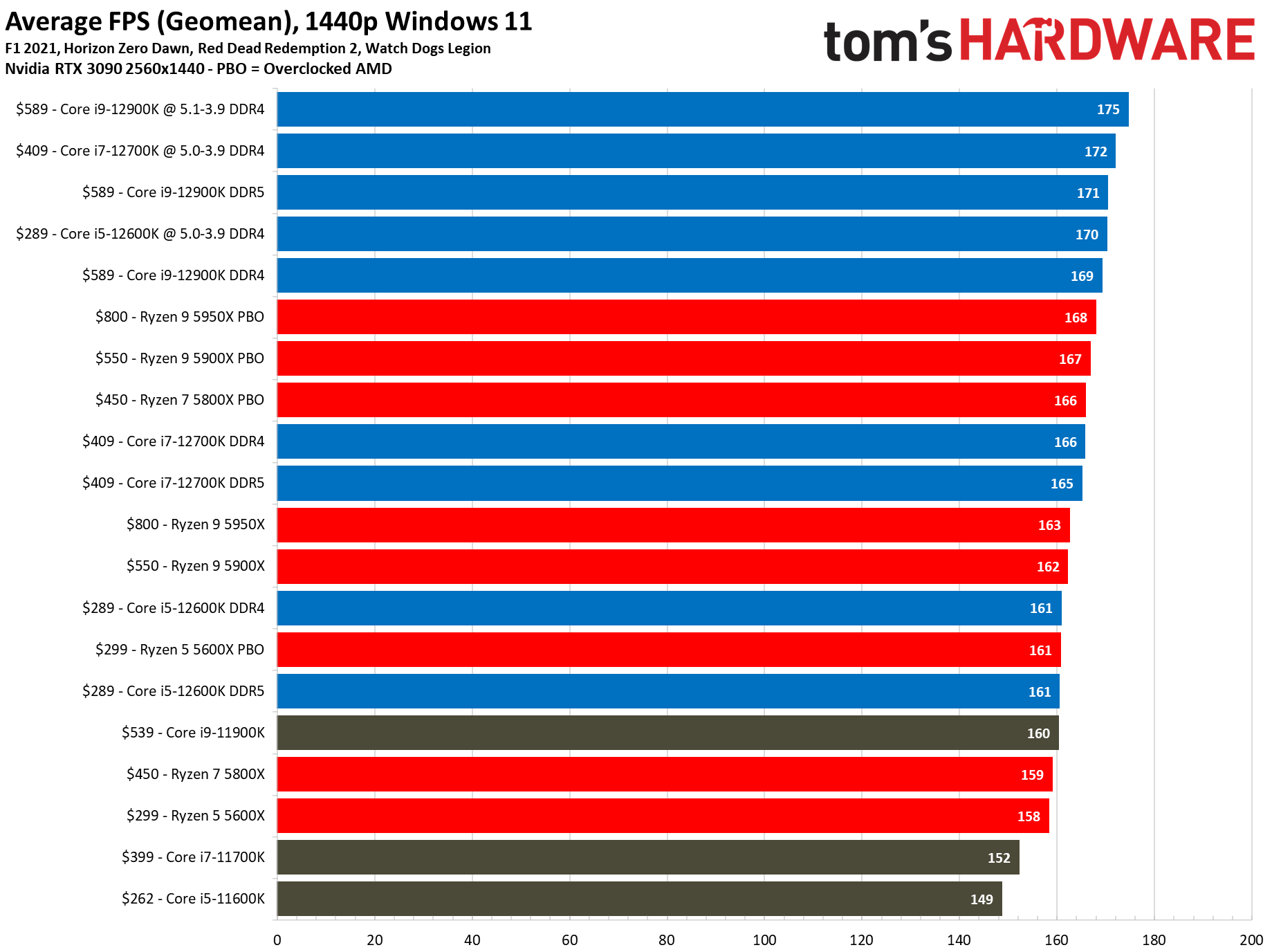
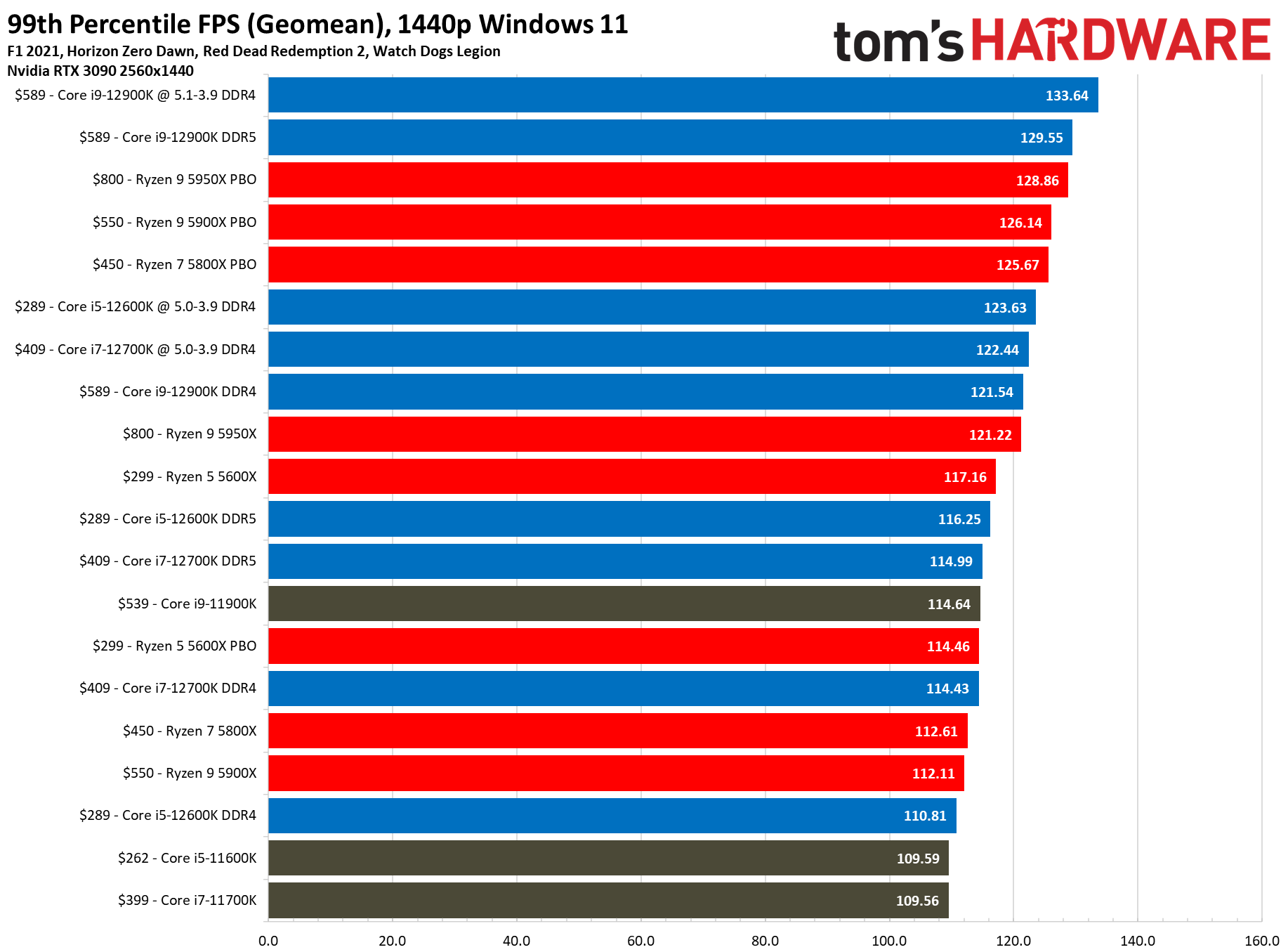
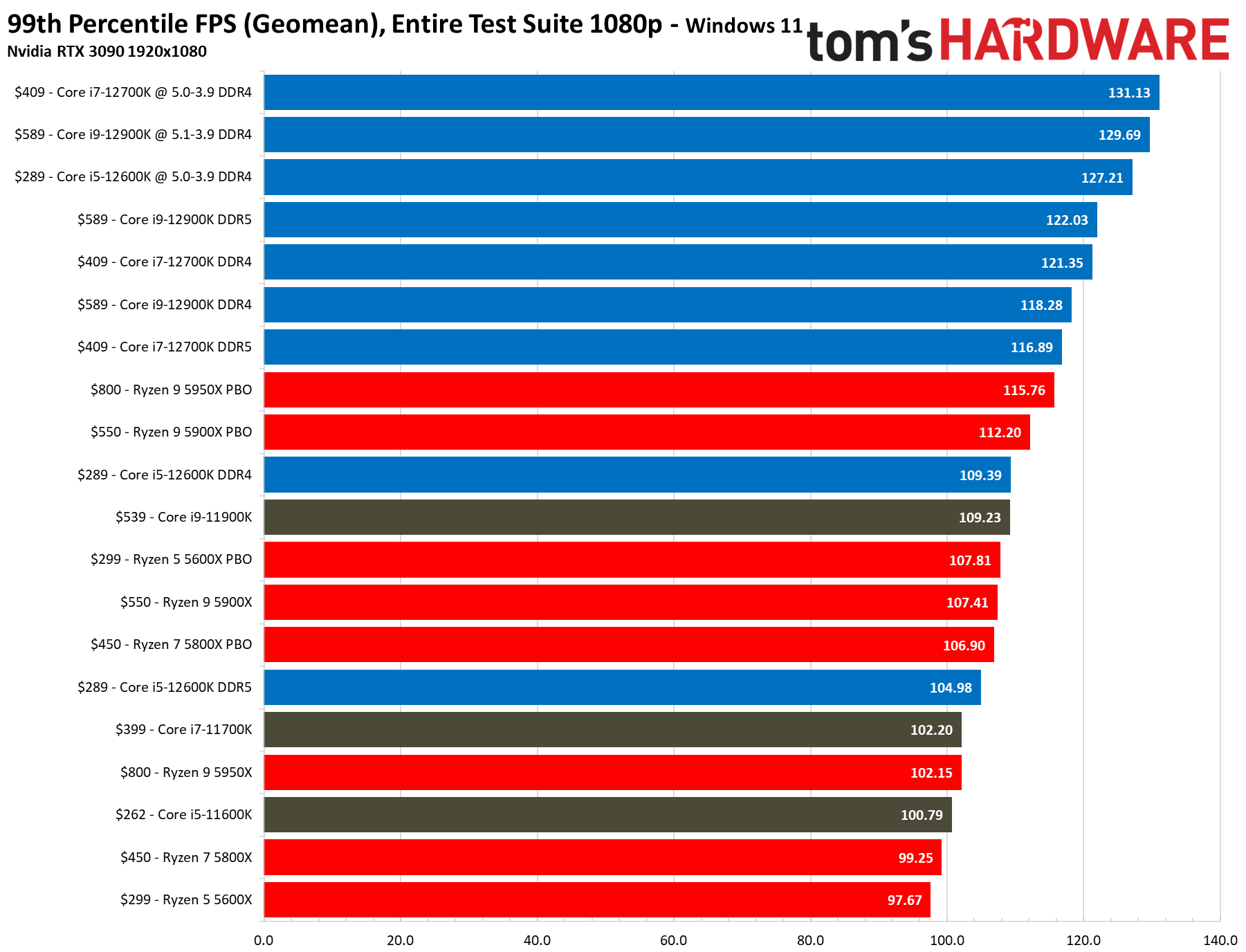
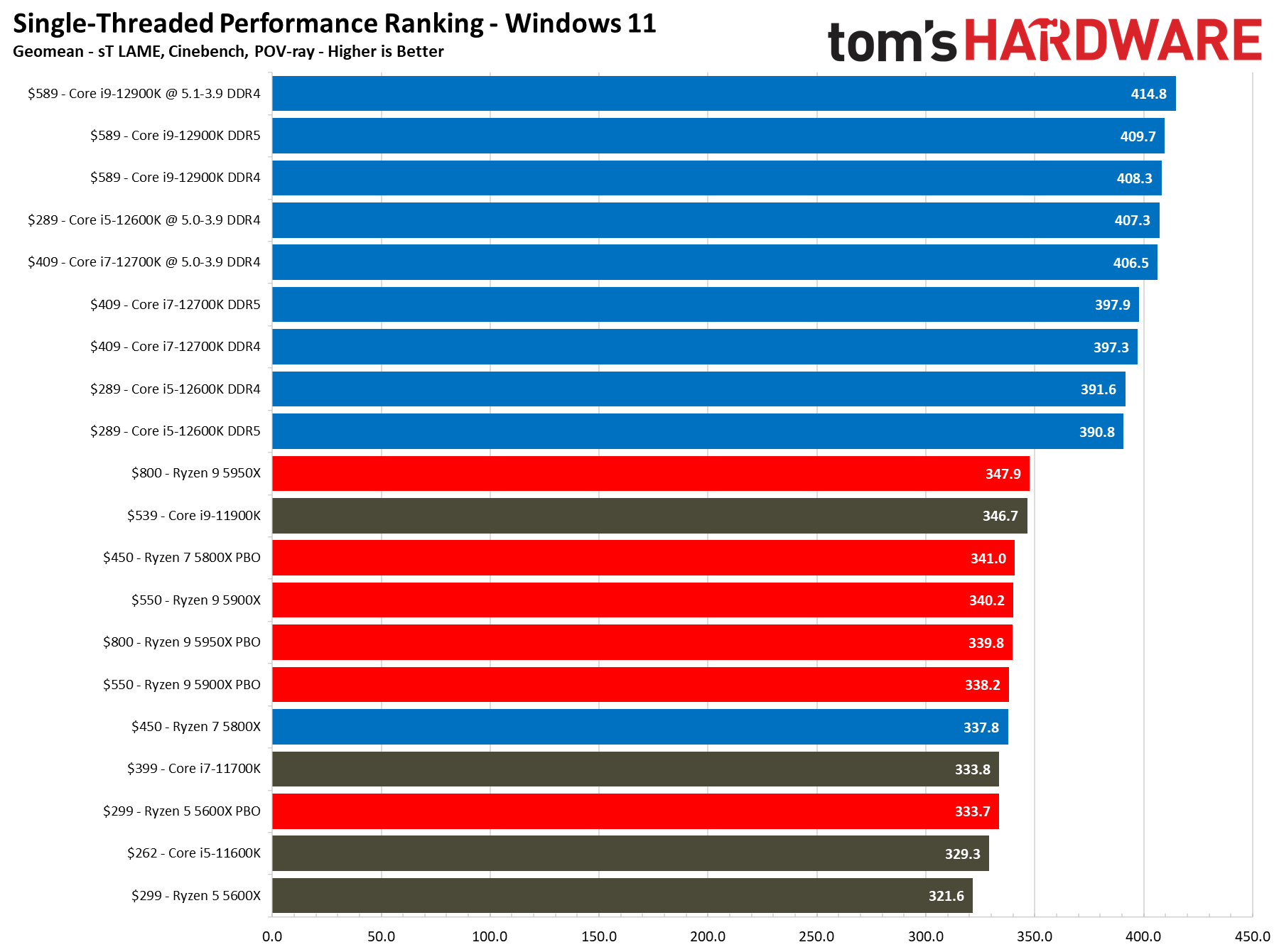
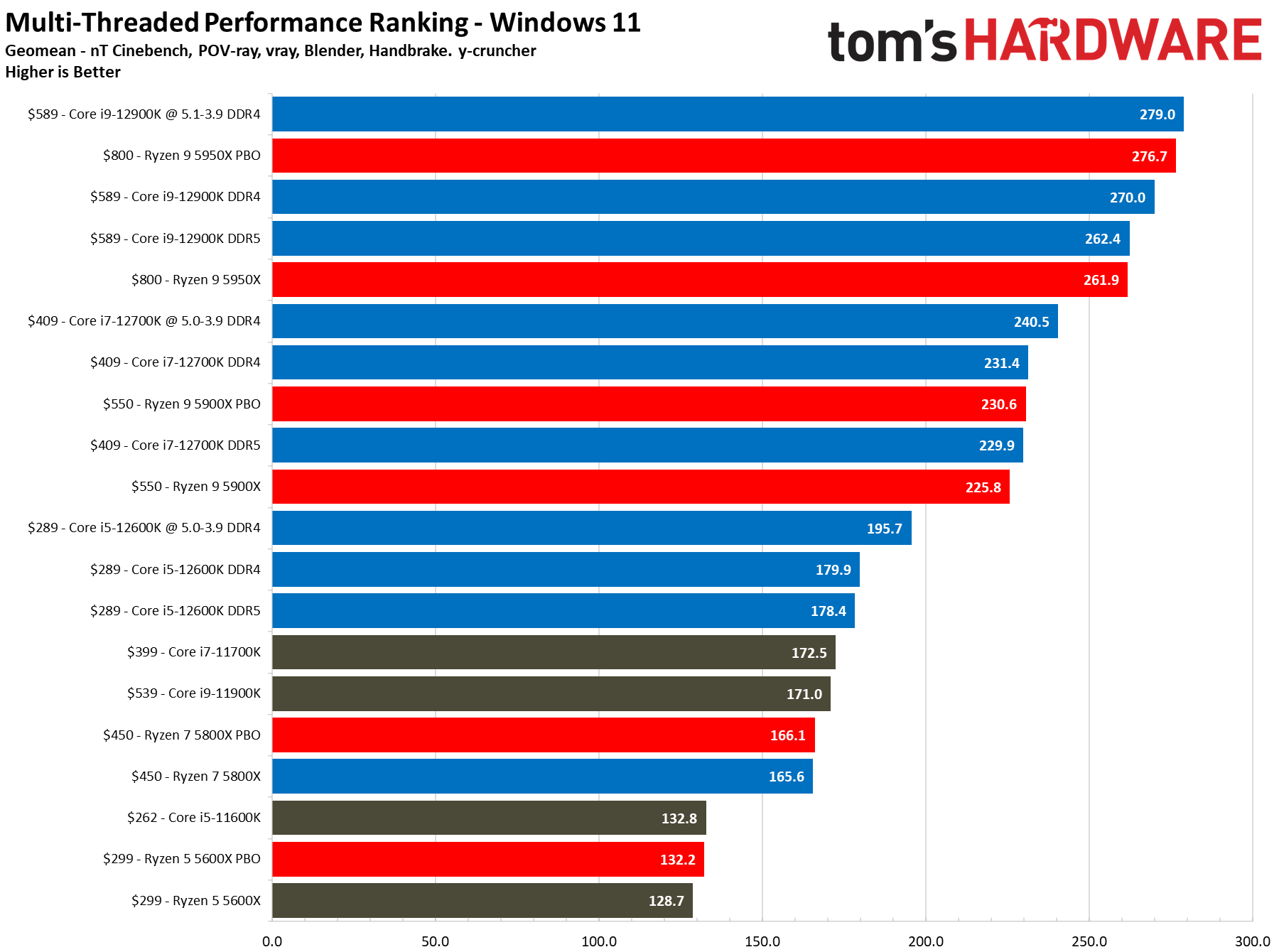
At its price point, the Core i7-12700K is a no-brainer for gamers looking for the highest-end performance, but much like we encountered in our testing, there could be initial hiccups with Windows 10 systems. Those problems could include performance variability or programs that don't operate to their full potential, but we expect that these software stumbles will be fixed over time as the industry adjusts to hybrid architectures. You can rectify the issues now with built-in Windows tools or friendlier third-party applications like Process Lasso, but be aware that Windows 10 could require some fine-tuning.
In 1080p gaming, the $409 Core i7-12700K is an impressive 12% faster than the Ryzen 7 5800X and 7.5% faster than the Ryzen 9 5900X that holds the title as AMD's fastest gaming chip. It also provides essentially the same performance as the Core i9-12900K.
The 12700K's performance in applications is just as impressive. In lightly-threaded apps, the 12700K is ~17% faster than the 5800X and 5900X. In threaded work, the Core i7-12700K is 2.5% faster than the Ryzen 9 5900X, though the 5900X does carve out a few wins in heavily-threaded apps. The competition isn't even close with the Ryzen 7 5800X — the 12700K is 40% faster in threaded work.
Given the 12700K's impressive price-to-performance ratio, the question becomes whether to buy it or the Core i9-12900K. If you're focused primarily on gaming, the Core i7-12700K delivers essentially the same performance for $180 less. The Core i9-12900K really proves its worth in threaded applications, where it is ~15% faster than the 12700K primarily on the strength of its four additional E-cores, and in single-threaded applications, where it is 3% faster than the 12700K due to its 200 MHz boost clock advantage.
Alder Lake proves that overclocking is certainly not dead. After tuning, the Core i7-12700K with DDR4 was 9.8% faster than the stock configuration at 1080p gaming. After overclocking, the Core i7-12700K was also 4.4% faster in lightly-threaded work and 3.9% faster in multi-threaded workloads. Overall, the Alder Lake chips are a boon for enthusiasts. By comparison, the overclocked Ryzen chips were anywhere from 3.7% to 6.6% faster after tuning, so it's clear Intel holds the lead here.
The Core i7-12700K also has a much more modern platform than AMD's AM4 ecosystem. Leading-edge DDR5 and PCIe 5.0 interfaces will add some cost in the early days, but support for DDR4 can help reduce that overhead. It's also clear that you won't need to adopt pricey DDR5 memory to unlock the best gaming performance — unless you have a very specific need for DDR5 throughput, it's probably best to skip it until it matures further.
The Core i7-12700K still consumes more power than AMD's competing chips, but the new 'Intel 7' process reduces power consumption and nearly doubles power efficiency, reducing AMD's massive advantage in that key area.
Intel's hybrid x86 architecture presents a new paradigm, but Intel's bold transition to not one but two entirely new architectures in the Alder Lake SoC spurred a massive generational leap forward in nearly all facets, including gaming, performance in lightly- and heavily-threaded work, power consumption, and platform connectivity options.
AMD will respond with its 3D V-Cache processors with up to 192MB of L3 cache per chip, imparting up to 15% more gaming performance. Those chips arrive next year, and while the impact on gaming in a broad spate of titles is unknown, AMD has confirmed that the chips will drop into the AM4 platform. In the meantime, we could see some pricing adjustments on Ryzen 5000 series processors.
The Core i7-12700K delivers incredible levels of threaded performance, often rivaling or beating the Ryzen 9 5900X, but at a much lower price point. That type of performance will pay off in all manner of productivity applications. If you're looking for snappy performance in lighter fare, it also offers leading single-threaded performance in its price class, and by a large margin.
For gamers looking for the best value, the Core i5-12600K remains the best CPU for gaming. However, if you're primarily looking for a high-performance gaming chip, the Core i7-12700K is the chip you seek — the Core i9-12900K doesn't deliver enough extra gaming performance to justify its price tag. The 12900K serves up extra cores and extra boost speed for those looking for the utmost in productivity performance, but the Core i7-12700K is a well-rounded chip that provides an impressive blend of pricing and performance in both gaming and applications.
Get Tom's Hardware's best news and in-depth reviews, straight to your inbox.
- MORE: Best CPUs for Gaming
- MORE: CPU Benchmark Hierarchy
- MORE: AMD vs Intel
- MORE: All CPUs Content
Current page: Core i9 Gaming for i7 Pricing
Prev Page Intel Core i7-12700K Application Benchmarks
Paul Alcorn is the Editor-in-Chief for Tom's Hardware US. He also writes news and reviews on CPUs, storage, and enterprise hardware.
-
Soaptrail I like that the summary under the graph for the games average says 12% faster than the AMD 5800 but no one is going to be using a 12700K to play at 1080p. If we go to 1440p the Intel still wins but only by 4% and even then any of these CPU's are all solid choices for gaming. I will give Intel the win but we are splitting hairs on saying it is 12% better at 1080p.Reply